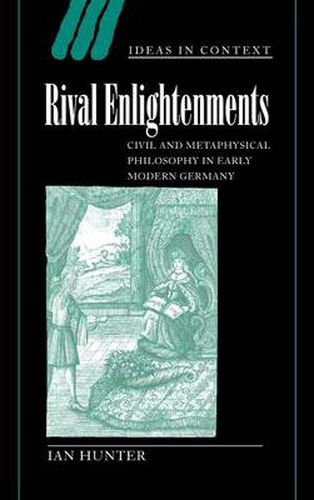Readings Newsletter
Become a Readings Member to make your shopping experience even easier.
Sign in or sign up for free!
You’re not far away from qualifying for FREE standard shipping within Australia
You’ve qualified for FREE standard shipping within Australia
The cart is loading…






Rival Enlightenments is a major reinterpretation of early modern German intellectual history. Ian Hunter approaches philosophical doctrines as ways of fashioning personae for envisaged historical circumstances, here of confessional conflict and political desacralisation. He treats the civil philosophy of Pufendorf and Thomasius and the metaphysical philosophy of Leibniz and Kant as rival intellectual cultures or paideiai, thereby challenging all histories premised on Kant’s supposed reconciliation and transcendence of the field. This landmark study reveals for the first time in English the extraordinary historical self-consciousness of the civil philosophers, who repudiated university metaphysics as inimical to the intellectual formation of those administering desacralised territorial states. The book argues that the marginalisation of civil philosophy in post-Kantian philosophical history may itself be seen as a continuation of the struggle between the rival enlightenments. Combining careful and well-documented scholarship with vivid polemic, Hunter presents penetrating insights for philosophers and historians alike.
$9.00 standard shipping within Australia
FREE standard shipping within Australia for orders over $100.00
Express & International shipping calculated at checkout
Rival Enlightenments is a major reinterpretation of early modern German intellectual history. Ian Hunter approaches philosophical doctrines as ways of fashioning personae for envisaged historical circumstances, here of confessional conflict and political desacralisation. He treats the civil philosophy of Pufendorf and Thomasius and the metaphysical philosophy of Leibniz and Kant as rival intellectual cultures or paideiai, thereby challenging all histories premised on Kant’s supposed reconciliation and transcendence of the field. This landmark study reveals for the first time in English the extraordinary historical self-consciousness of the civil philosophers, who repudiated university metaphysics as inimical to the intellectual formation of those administering desacralised territorial states. The book argues that the marginalisation of civil philosophy in post-Kantian philosophical history may itself be seen as a continuation of the struggle between the rival enlightenments. Combining careful and well-documented scholarship with vivid polemic, Hunter presents penetrating insights for philosophers and historians alike.